ASRock X79 Extreme11 Review: PCIe 3.0 x16/x16/x16/x16 and LSI 8-Way SAS/SATA
by Ian Cutress on September 3, 2012 10:15 AM EST- Posted in
- Motherboards
- ASRock
- X79
- LSI
- PLX
USB Speed
For this benchmark, we run CrystalDiskMark to determine the ideal sequential read and write speeds for the USB port using our 240 GB OCZ Vertex3 SSD with a SATA 6 Gbps to USB 3.0 converter. Then we transfer a set size of files from the SSD to the USB drive using DiskBench, which monitors the time taken to transfer. The files transferred are a 1.52 GB set of 2867 files across 320 folders – 95% of these files are small typical website files, and the rest (90% of the size) are the videos used in the Sorenson Squeeze test.
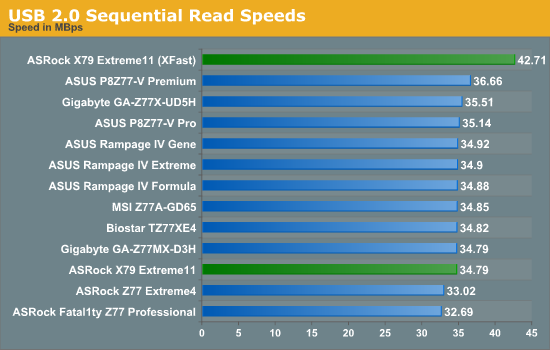
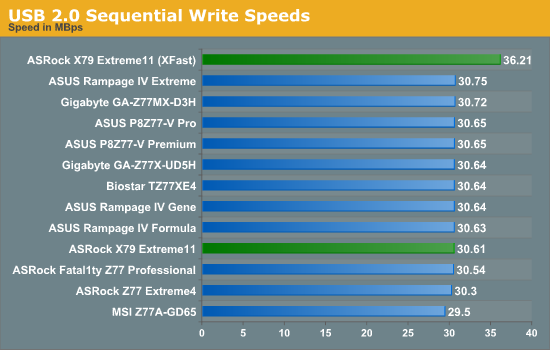
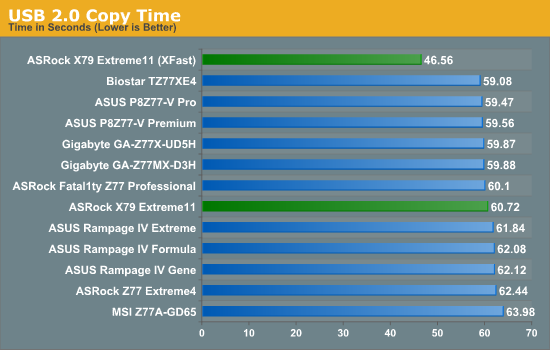
Nothing odd comes out of any USB 2.0 testing.
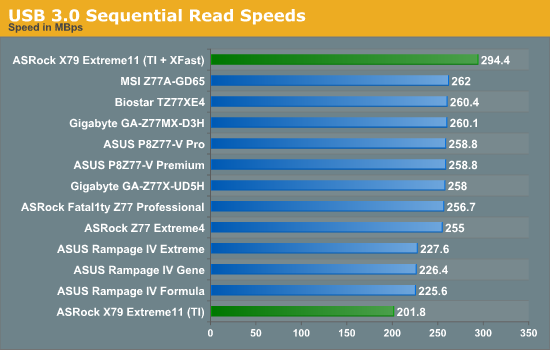
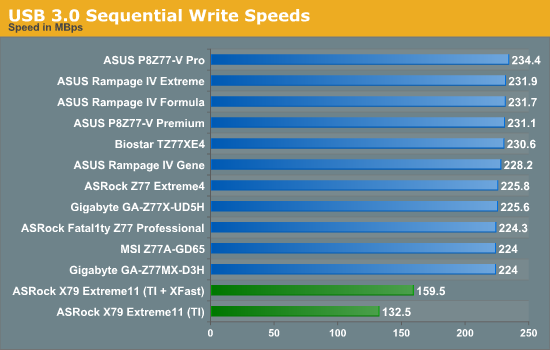
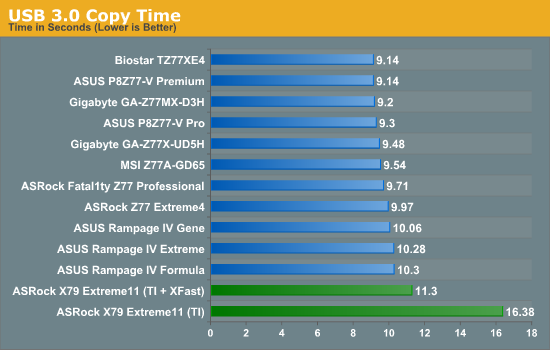
While the Z77 chipset has USB 3.0 native to the chipset, the X79 motherboards have controllers. In the case of the ASRock X79 Extreme11, we have Texas Instruments based USB 3.0 controllers, which perform rather badly in USB 3.0 writes compared to those found on the ASUS ROG boards.
SATA Testing
We also use CrystalDiskMark for SATA port testing on a C300 drive. The sequential test (incompressible data) is run at the 5 x 1000 MB level. This test probes the efficiency of the data delivery system between the chipset and the drive, or in the case of additional SATA ports provided by a third party controller, the efficiency between the controller, the chipset and the drive.
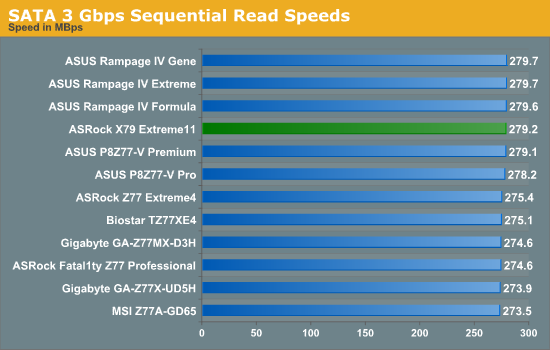
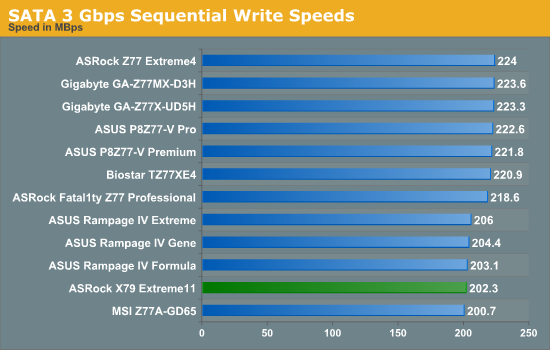
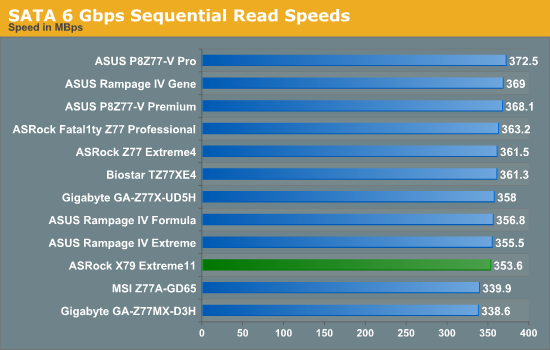
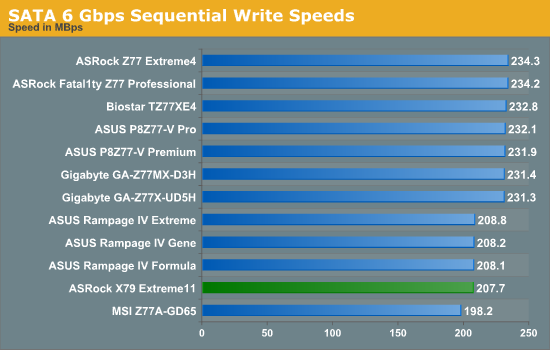
Nothing out of the ordinary comes out of our SATA testing - the SATA writing speed is split when comparing the X79 and Z77 platforms. Testing on the LSI ports will be in a later page of this review.
DPC Latency
Deferred Procedure Call latency is a way in which Windows handles interrupt servicing. In order to wait for a processor to acknowledge the request, the system will queue all interrupt requests by priority. Critical interrupts will be handled as soon as possible, whereas lesser priority requests, such as audio, will be further down the line. So if the audio device requires data, it will have to wait until the request is processed before the buffer is filled. If the device drivers of higher priority components in a system are poorly implemented, this can cause delays in request scheduling and process time, resulting in an empty audio buffer – this leads to characteristic audible pauses, pops and clicks. Having a bigger buffer and correctly implemented system drivers obviously helps in this regard. The DPC latency checker measures how much time is processing DPCs from driver invocation – the lower the value will result in better audio transfer at smaller buffer sizes. Results are measured in microseconds and taken as the peak latency while cycling through a series of short HD videos - under 500 microseconds usually gets the green light, but the lower the better.
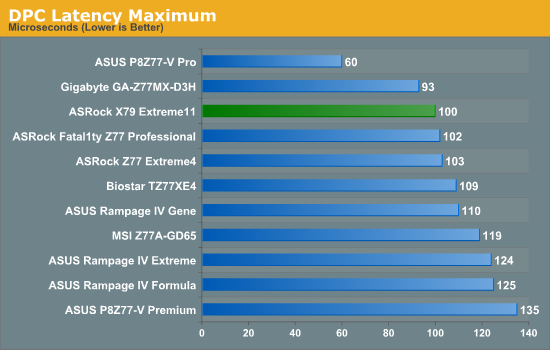
ASRock have a good standing in our DPC testing, and the X79 Extreme11 is no different. It comes in at 100 microseconds, well below the 500 microsecond ceiling or 200 microsecond recommended minimum.










62 Comments
View All Comments
AssBall - Tuesday, September 4, 2012 - link
It is like buying an F350 Superduty Harly Davidson Ed. when a Honda Fit would haul all your stuff. But hey, more power to ya!Taristin - Monday, September 3, 2012 - link
Almost 2013 and the board still says ATi Crossfire X? Hasn't AMD officially retired the ATi brand yet?Grebuloner - Monday, September 3, 2012 - link
This is bothering me as I started reading: You keep mentioning 70 lanes of PCIe with the two PLX chips+CPU leftover...divided into 64 for the x16's and "the other 8" for the LSI chip. 64+8=70? Why not just write 72 and end the confusion?IanCutress - Monday, September 3, 2012 - link
Yes, simple math fail. A brain fart. Call it what you will, I made a mistake, and it should now be corrected. Though a simple email would be a lot more polite... :)Ian
Performance Fanboi - Monday, September 3, 2012 - link
Nope, you made a simple arithmetic or grammar error on the internet, LET THE LASHINGS COMMENCE!Grebuloner - Monday, September 3, 2012 - link
Fair enough, my apologies, next time I shall email. Being a math teacher I get all riled up at math errors.errorman1 - Monday, September 3, 2012 - link
Mr math teacher, not to be rude but just thought I'd pass this bit of scientific wisdom along.When people make errors they do so largely unconsciously, human beings DONT live in reality sadly, including you. What you understand or makes it to your conscious awareness is only a fraction of what is going on in your brain which by and large you don't control.
Just remember the world doesn't operate on our expectations, morality and 'free will' it operates on cause and effect - the laws of nature. Everyone forgets this fact every day and it leads to great comedy!
The human mind has limited resources with which to attempt to model the world and it's environment so we should expect errors and blunders as just a law of nature that in many instances people not as blesses in terms of well functioning complex of biological processes.
http://bit.ly/dYaWUc
Death666Angel - Tuesday, September 4, 2012 - link
I don't see posting the mistake in the comments as impolite. I have done so on a few occasions (typos, wrong calculations...) and did so because it was the fastest way for me to do that. Expecting me to fire up the email program or go to my online email, log in, copy your email adress, type up a formal email, all to appear polite to you while trying to help you is asking for a lot. :-)mfenn - Monday, September 3, 2012 - link
The comment in the article, "the LSI controller allows for RAID 0, 1 and 10 only, which is a little odd," struck me as a little odd.The LSI SAS 2308 is a lower-end chip based on their Fusion-MPT architecture, which has never had an onboard cache or parity (RAID5 and 6) support. Fusion-MPT chips, suitably rebranded of course, are typically used as the base option for SAS connectivity in enterprise-grade servers, with an option to upgrade to a more featureful RAID controller with onboard cache and parity support.
FunBunny2 - Monday, September 3, 2012 - link
Real Men don't use RAID 5/6.